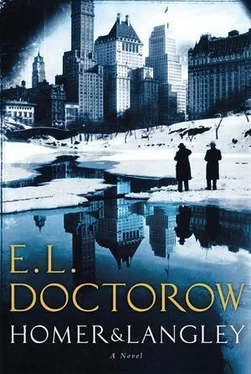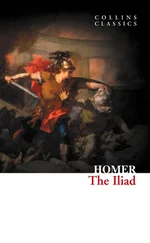IT WAS MY BROTHER, not either of my parents, who was in the habit of reading to me once I could no longer read for myself. Of course I had my books in Braille. I read all of Gibbon in Braille. In the second century of the Christian era, the Empire of Rome comprehended the fairest part of the earth, and the most civilized portion of mankind … I still believe that is a sentence more deliciously felt with one’s fingers than seen with one’s eyes. Langley read aloud to me from the popular books of the day — Jack London’s The Iron Heel , and his stories of the Far North, or A. Conan Doyle’s The Valley of Fear , about Sherlock Holmes and the fiendish Moriarty — but before he switched to newspapers, reading to me of the war in Europe to which he was destined to go, Langley used to bring back from the secondhand bookshops slim volumes of poetry and read from them as if poems were news. Poems have ideas, he said. The ideas of poems come out of their emotions and their emotions are carried on images. That makes poems far more interesting than your novels, Homer. Which are only stories.I don’t remember the names of the poets Langley found so newsworthy, nor did the poems stick in my mind but for a line or two. But they pop up in my thoughts usually unbidden and they give me pleasure when I recite them to myself. Like Generations have trod, have trod, have trod / And all is seared with trade, bleared, smeared with toil… — there’s a Langleyan idea for you.
WHEN HE WAS GOING off to war, my parents had a dinner for him, just the family at table — a good roast of beef, and the smell of candle wax and my mother weeping and apologizing for weeping and my father clearing his throat as he proposed a toast. Langley was to embark that night. Our soldier in the family was going over there to take the place of a dead Allied soldier, just according to his theory. At the front door I felt his face to memorize it at that moment, a long straight nose, a mouth set grimly, a pointed chin, much like my own, and then the overseas cap in his hand, and the rough cloth of his uniform, and the puttees on his legs. He had skinny legs, Langley. He stood straight and tall, taller and straighter than he would ever be again.So there I was — without my brother for the first time in my life. I found myself as if vaulted into my own young independent manhood. That would be tested soon enough because of the Spanish flu pandemic that hit the city in 1918 and like some great predatory bird swooped down and took off both our parents. My father died first because he was associated with the Bellevue Hospital and that’s where he came down with it. Naturally, my mother soon followed. I call them my father and mother when I think of them dying so suddenly and painfully, choking to death in a matter of hours, which is the way the Spanish flu did people in.To this day I don’t like to think about their deaths. It is true that with the onset of my blindness there had been a kind of a retrenchment of whatever feelings they had for me, as if an investment they had made had not paid off and they were cutting their losses. Nevertheless, nevertheless, this was the final abandonment, a trip from which they were not to return, and I was shaken.It was said that the Spanish flu was taking mostly young people though in our case it was the opposite. I was spared though I did feel poorly for a while. I had to handle the arrangements for Mother as she had handled them for her husband before she too went and died, as if she couldn’t bear to be away from him for a moment. I went to the same mortician she had used. Burying people was a roaring business at this time, the usual unctuous formalities were dispensed with and corpses were transported speedily to their graves by men whose muffled voices led me to understand they were wearing gauze masks. Prices had risen too: by the time Mother died the exact same arrangements she had made for Father cost double. They had had many friends, a large social circle, but only one or two distant cousins turned up for the obsequies, everyone else sitting home behind locked doors or going on to their own funerals. My parents are together for eternity at the Woodlawn Cemetery up past what was the village of Fordham, though it is all the Bronx now, and of course unless there’s an earthquake.At this time of the flu, Langley, gone to war in Europe with the AEF, was reported missing. An army officer had come to the door to deliver the news. Are you sure? I said. How do you know? Is this your way of saying he’s been killed? No? Then you are not saying anything more than that you don’t know anything. So why are you here?Of course I had acted badly. I remember I had to calm myself by going to my father’s whiskey cabinet and taking a slug of something right from the bottle. I asked myself if it was possible for my entire family to be wiped out in the space of a month or two. I decided it was not possible. It was not like my brother to desert me. There was something about Langley’s worldview, firmly in place at his birth, though perhaps polished to a shine at Columbia College, that would confer godlike immunity to such an ordinary fate as death in a war: it was innocents who died, not those born with the strength of no illusions.So once I persuaded myself of that, whatever state I was in, it was nothing like a mourning state. I was not grieving, I was waiting.And then of course, through the slot in the front door, a letter from my brother from a hospital in Paris dated a week after I had received the official visit telling me he was missing in action. I had Siobhan our maid read the letter to me. Langely had been gassed on the western front. Nothing fatal, he said, and with certain compensations from attentive army nurses. When they tired of him, he said, he would be sent home.Siobhan, a pious Irishwoman of a certain age, did not like to read of the attentions of army nurses, but I was laughing with relief and so she relented and had to admit how happy she was that Mr. Langley was alive and sounding just like himself.
UNTIL MY BROTHER got home, there I was alone in the house but for the staff, a butler, a cook, and two maids, all of whom had rooms and one bath on the top floor. You will ask how a blind man handles his business affairs with servants in the house who might think how easy it would be to steal something. It was the butler I worried about, not that he had actually done anything. But he was too slyly solicitous of me, now that I was in charge and no longer the son. So I fired him and kept the cook and the two maids, Siobhan and the younger Hungarian girl Julia, who smelled of almonds and whom I eventually took to bed. Actually he was not just a butler, Wolf, but a butler-chauffeur and sometime handyman. And when we still had a carriage he would bring it around from the stable on Ninety-third street and drive my father to the hospital at the crack of dawn. My father had been very fond of him. But he was a German, this Wolf, and while his accent was slight he could not put his verbs anywhere but at the end of the sentence. I had never forgiven him for the way he whipped our carriage horse, Jack, than whom no finer or more gallant a steed has ever lived, and though he had been in the family’s employ since I could remember, Wolf, I mean, and while I could tell from his footsteps that he was no longer the youngest of men, we were, after all, at war with the Germans and so I fired him. He told me he knew that was the reason though I of course denied it. I said to him, What is Wolf short for? Wolfgang, he said. Yes, I said, and that is why I’m firing you because you have no right to the name of the greatest genius in the history of music.Even though I was giving him a nice packet of send-off money, he had the ill grace to curse me and leave by the front door, which he slammed for good measure.But as I say it took some working out to settle my father’s estate with his lawyers and to arrange some means of dealing with boring household management. I enlisted one of the junior clerks at the family bank to do the bookkeeping and once a week I put on a suit and slapped a derby on my head and set off down Fifth Avenue to the Corn Exchange. It was a good walk. I used a stick but really didn’t need it having made a practice as soon as I knew my eyes were fading of surveying and storing in my memory everything for twenty blocks south and north, and as far east as First Avenue and to the paths in the park across the street all the way to Central Park West. I knew the length of the blocks by the number of steps it took from curb to curb. I was just as happy not to have to see the embarrassing Renaissance mansions of the robber barons to the south of us. I was a vigorous walker and gauged the progress of our times by the changing sounds and smells of the streets. In the past the carriages and the equipages hissed or squeaked or groaned, the drays rattled, the beer wagons pulled by teams passed thunderously, and the beat behind all this music was the clopping of the hooves. Then the combustive put-put of the motorcars was added to the mix and gradually the air lost its organic smell of hide and leather, the odor of horse manure on hot days did not hang like a miasma over the street nor did one now often hear that wide-pan shovel of the street cleaners shlushing it up, and eventually, at this particular time I am describing, it was all mechanical, the noise, as fleets of cars sailed past in both directions, horns tooting and policemen blowing their whistles.I liked the nice sharp sound of my stick on the granite steps of the bank. And inside I sensed the architecture of high ceilings and marble walls and pillars from the hollowed-out murmur of voices and the chill on my ears. These were the days I thought I was acting responsibly, carrying on as a replacement of the previous Collyers as if I was hoping for their posthumous approval. And then Langley came home from the World War and I realized how foolish I had been.
Читать дальше












